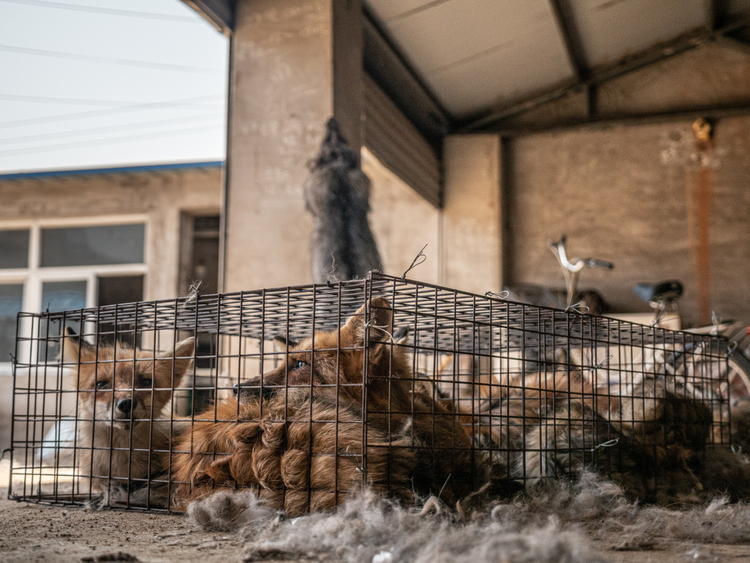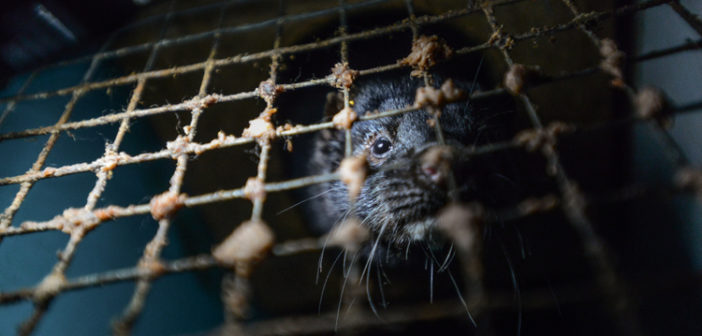China has made great progress in the last year in terms of publicizing its bans on dog meat and the wildlife trade. However, some measures are still required to help reduce the risk of “COVID-X”
Our recent letters to President Xi Jinping & the Ministry of Agriculture and Rural Affairs point out that this risk is still present in the vast fur-farming industry in China, which shares some common unhygienic conditions with the exotic meat trade.
We hope China will continue its progressive streak by removing racoon dogs, silver foxes and mink from its livestock catalogue and begin dismantling its fur industry.

Read our letter to President Xi Jinping below. The letter is also available in full here, complete with Chinese translations and all signing and supporting organizations listed.
Dear His Excellency Mr Xi Jinping,
We are writing on behalf of the Asia for Animals Coalition, representing international animal welfare and conservation organizations. We express our concerns over the continued farming of mink and other wild animals in China in the face of the high risk of SARS-CoV-2 virus transmission and other zoonotic risks that these practices present.
China has one of the world’s biggest mink farming operations. We appeal to you to extend the wildlife trade and consumption ban, adopted on February 24, 2020, by your National People’s Congress (NPC), to all wildlife farming operations, including farming for fur, as well as for traditional medicine, display, and laboratory use. We commend the NPC’s decision to implement this ban, and would like to bring to your attention that fur animal farming is as much of a public health risk, as is the banned practice of farming wild animals as food. We understand, however, that fur animals have been included in the National Catalogue of Livestock and Poultry Genetic Resources (hereafter referred to as “the Catalog”),and are thus exempt from the ban. We respectfully urge you and China’s national legislature to remove minks, raccoon dogs, and foxes from the Catalog. The mode of production that features in China’s wildlife farming for the exotic food market, also prevails in the farming operations for fur, for traditional medicine and for other commercial purposes.
Danger to Public Health
Between April and December, 2020, there have been at least 405 outbreaks of COVID-19 on fur farms in 11 different countries. Farmed American mink in the Netherlands, Denmark, Spain, USA, Sweden, Italy, Greece, France, Poland, Lithuania and Canada have been infected, and in some countries, the virus has rapidly spread from one farm to the other.
Fur production with thousands of animals (sometimes more than 150,000 mink) on each farm poses a risk to public health. This enormous assembly of animals highly susceptible to COVID-19, crammed into very little space, means that once the virus enters the farm, it can spread rapidly among the animals, with great potential for mutations and the development of new virus variants.
Fur farming has already been fully banned in more than a dozen European countries, and an additional six countries are considering a ban on the practice. In Denmark, approximately 17 million mink have been culled following the rapid spread of the virus on more than 289 farms that could not be stopped by the application of strict biosecurity measures. There have been more than two hundred of human cases of COVID-19 related to mink, including at least 12 Danish people who were infected with a new strain of COVID-19, which had mutated in the animals on the farms and spread from mink back to humans. This new strain was of specific concern, as it was feared it could undermine the effect of a future vaccine. Experts from Denmark’s State Serum Institute noted that mink fur farmers had a greater risk of becoming infected with COVID-19 than a nurse or a doctor.
Fur Farming in China
In May 2020, as a result of the global COVID-19 pandemic, the Standing Committee of the National People’s Congress in China made a historical decision to outlaw wildlife farming and trade for the exotic food market. This proposed legislation prohibits commercial trade in live or dead wildlife as food, excluding certain species listed as livestock. Trade in wildlife for other purposes, including clothing and fur, is unfortunately still permitted. This allowance for the legal trade to continue undermines the efforts to avert future spillover events, and provides a route for novel diseases to threaten public health again and again.
We understand that fur animal farming is a major industry in parts of China. It has also contributed to your country’s regional poverty reduction efforts. However, we have also noted that fur farming and related productions are a drop in the great ocean of China’s gigantic GDP. While the industry overwhelmingly benefits a small number of big business owners, it is not the main source of income for the majority of farm workers, many of whom are part-time, seasonal, and hourly-paid workers.
As demonstrated by the current global health crisis, wildlife consumption and use, including fur animal farming, poses a grave threat to human health, both in China and worldwide. The mode of farmed fur production features huge numbers of wild animals kept in crowded environments. Frequent and inappropriate contact between humans and wildlife is a key cause of novel disease outbreaks, including SARS, Ebola and COVID-19. In fact, one of the animal species named in the draft legislation as “special livestock,” and therefore exempt from the ban, is the raccoon dog, which is frequently farmed for fur. Raccoon dogs are also “one of the suspected intermediate hosts of severe acute respiratory syndrome coronavirus (SARS-CoV)”
Like humans, mink present both asymptomatically and with symptoms of the disease, so the death rate at the farms affected can be significantly elevated. This raises additional concerns about the welfare of fur animals. The potential for creating a reservoir of disease on Chinese fur farms is alarming. These farms are already unable to meet the welfare needs of the animals. It is extremely unlikely that they will be able to implement appropriate biosecurity measures.
In the interest of biosecurity and worldwide public safety, China can take the lead to reduce this urgent public health risk by ending fur animal farming operations and other commercial wildlife breeding programs. Fur animals are not livestock, and should be excluded from the Catalog, which is currently in the final stages of revision.
We are grateful that China has taken a decisive step to outlaw wildlife trade and the consumption of exotic foods, as part of the Chinese government’s response to the COVID-19 pandemic. But the ban should be extended to fur animal farming and all other commercial farming operations for use in traditional medicine, in display and in laboratory use; and move these animals to be protected under the Wildlife Protection Law. The public safety of the 1.4 billion Chinese people is China’s national interest. And this national interest is above the interest of the wildlife breeders and traders.
We respectfully request that your office:
- Implement mandatory active testing of mink, fox and raccoon dogs on fur farms in China, and the workers in close contact with them, to determine if COVID-19 is present within the farms; then implement an ongoing “Early Warning System” to check cadavers submitted on a weekly basis for testing for the virus;
- Put an early-warning system in place to weekly test all “found dead” animals, a sample of live animals, and workers from each farm, which will identify if COVID-19 has arrived on the farm;
- Stop all import and export of live fur animals, including those used for breeding purposes and raw fur pelts to prevent the spread of COVID-19;
- Move all four fur animals—blue fox, silver fox, mink, and raccoon dog—out of the Catalog;
- Extend the February 24, 2020, NPC trade and consumption ban to fur animal farming and all other commercial wildlife farming operations; and
- End the commercial use of wildlife and captive breeding for fur.
Featured image: mink at an Ontario fur farm. Image credit Jo-Anne McArthur / #MakeFurHistory.





